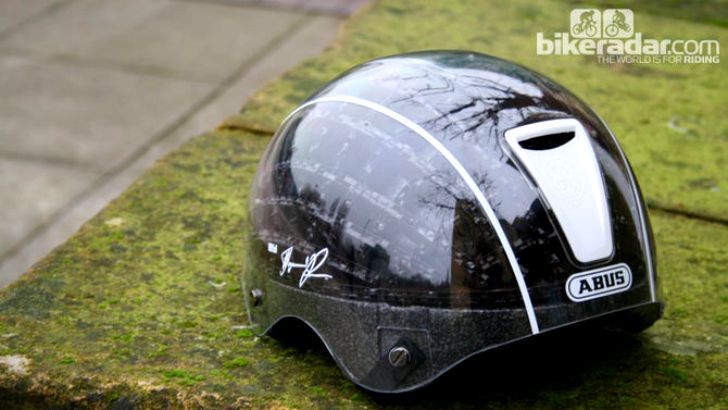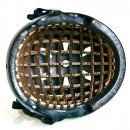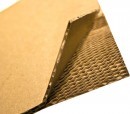More than 1 year ago, we reported on the Kranium, the helmet made from cardboard, an invention which promised to change the way we secure our heads when riding a bicycle. The story did not end there, as Anirudha Surabhi's idea got wings and now Abus is actually selling the Kranium.
German safety products Abus took Surabhi's idea and created a commercial bike helmet which currently sells for roughly $130 (€95). Not exactly a cheap bike helmet, but it's its exceptional shielding which pays off in case of a crash.
The Kranium was designed as a structure of multiple double-honeycomb cardboard braces inside a plastic shell and with an EPS liner for comfortable wearing. The D2 cardboard acts like a cluster of small airbags which crumple progressively and absorb impact energy.
Tests reveal that the Kranium can absorb 2 to 3 more energy during impacts, providing a dramatic safety increase. Traditional EPS helmets registered around 220G transmitted to the head after a 15 mph (25 km/h) impact, whereas the energy transmitted to the head by the Kranium in similar tests was around 70G.
Anirudha Surabhi got his ideas from the animal kingdom, as it happens more and more often. Namely, he was inspired by the corrugated cartilage which separates a woodpecker's beak from its skull, and which absorbs most of the energy of the pecking.
Surabhi is currently developing the Kranium design and hopes that people will make it past their suspicions. This cardboard helmet design is also lighter than EPS ones and thus offers better wearing comfort.
Follow the link for more on the Kranium helmet, including a comprehensive interview with Anirudha.
The Kranium was designed as a structure of multiple double-honeycomb cardboard braces inside a plastic shell and with an EPS liner for comfortable wearing. The D2 cardboard acts like a cluster of small airbags which crumple progressively and absorb impact energy.
Tests reveal that the Kranium can absorb 2 to 3 more energy during impacts, providing a dramatic safety increase. Traditional EPS helmets registered around 220G transmitted to the head after a 15 mph (25 km/h) impact, whereas the energy transmitted to the head by the Kranium in similar tests was around 70G.
Anirudha Surabhi got his ideas from the animal kingdom, as it happens more and more often. Namely, he was inspired by the corrugated cartilage which separates a woodpecker's beak from its skull, and which absorbs most of the energy of the pecking.
Surabhi is currently developing the Kranium design and hopes that people will make it past their suspicions. This cardboard helmet design is also lighter than EPS ones and thus offers better wearing comfort.
Follow the link for more on the Kranium helmet, including a comprehensive interview with Anirudha.











